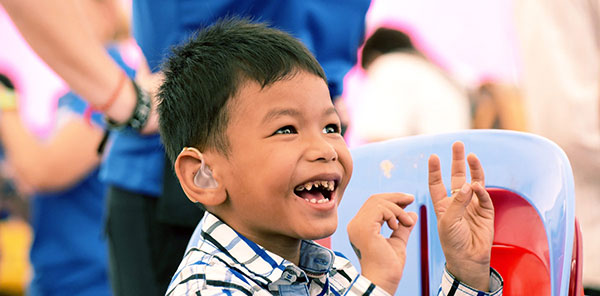 |
|
A boy receives hearing aids from the Starkey Hearing Foundation. [Photo/starkeyhearingfoundation.org] |
Xi'an Mayor Dong Jun praised the project and cleared the way for its operations. Cooperation between the government and the charity foundation went smoothly and was a big success.
Tao praised the Starkey team in China, saying, "You've not only helped over 3,000 hearing-impaired people but also done a wonderful job of people-to-people diplomacy. The Americans were impressed, moved and fascinated by Xi'an."
The Starkey Hearing Foundation described their first mission to China as "unparalleled."
Since their first success, the Starkey Hearing Foundation has donated 13,048 customized hearing aids in Xi'an, Chengdu, Guilin and their surrounding areas, and funded over 7,000 hearing-impaired people. They hope to help 100,000 more in the coming decade.
The hearing aids donated are all embedded with advanced digital chips and use customized in-canal technology to fit each individual's ears and hearing ability.
On the donation site, a volunteer group of doctors and audiologists from China and the U.S. saw each patient individually and helped them through the whole process, including hearing tests, sculpting ear models, wearing the hearing aids and teaching them how to use the devices. Passing on Love
When the project came to Dali, a local resident came for help.When he arrived, he seemed quiet and withdrawn. But after he received the hearing aids, he transformed into an active speaker with sparkling eyes. Now that he was able to communicate with people, he said, he would find work outside his village, and build a new house for his family. This is another example of how a world of sound can change people's lives.
Austin once said that he was more than a hearing aid producer. If he just wanted to donate stuff, simply shipping out several trainloads of products would suffice. But to truly make a difference to people's lives, he needed to understand the place where they live, their culture, and establish bonds with them.
"In small cities of Yunnan, the people live closer to nature, and they turn out to be simpler and more sincere than city dwellers," said Austin. "These people come from remote frontiers and look a little bit shy, but I believe if we open up a window, they will be able to feel our love. I want to pass on love through communication with people."
There was a father who traveled over 100 kilometers from his mountain village to find help for his daughter. However, the mission was about to close when he arrived, and he was still far from the hospital where hearing tests were conducted. A policeman drove the father and daughter to the hospital, and with last-minute coordination the closed procedures reopened for the little girl. During the donations, despite a back injury, Austin stayed on his feet all day long. When helping small children, he had to kneel down.
The donation drive lasted for 14 days, and Wang Xingning, chairman of the Yunnan Province Disabled Persons Federation, was on the site every day. When it rained, Wang set up tents so people could take shelter.
During the initial preparations Wang and his team travelled throughout the mountains to gather information. "We need not only the advanced hearing aids from Starkey Hearing Foundation, but also the spirit of Austin's team. They came across the world in person to donate hearing aids and help our people. We feel their love and friendship across borders," Wang said.
"Intercultural communication has many facets; people communicate across languages, cultures, and religions, but the communication of emotions is at its core," Tao said.
"There are around 361,000 disabled people in Guilin, whose incomes are half that of low-income groups, so they are among the most disadvantaged," new chairman of Guilin's Municipal Disabled Persons Federation, formerly in charge of industrial development in one of the city's districts, Li He said.